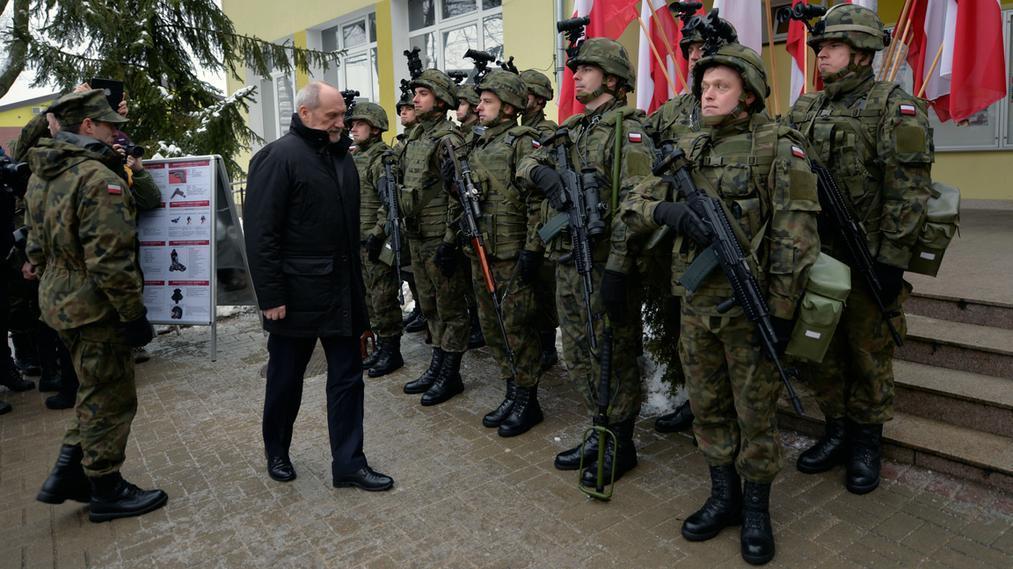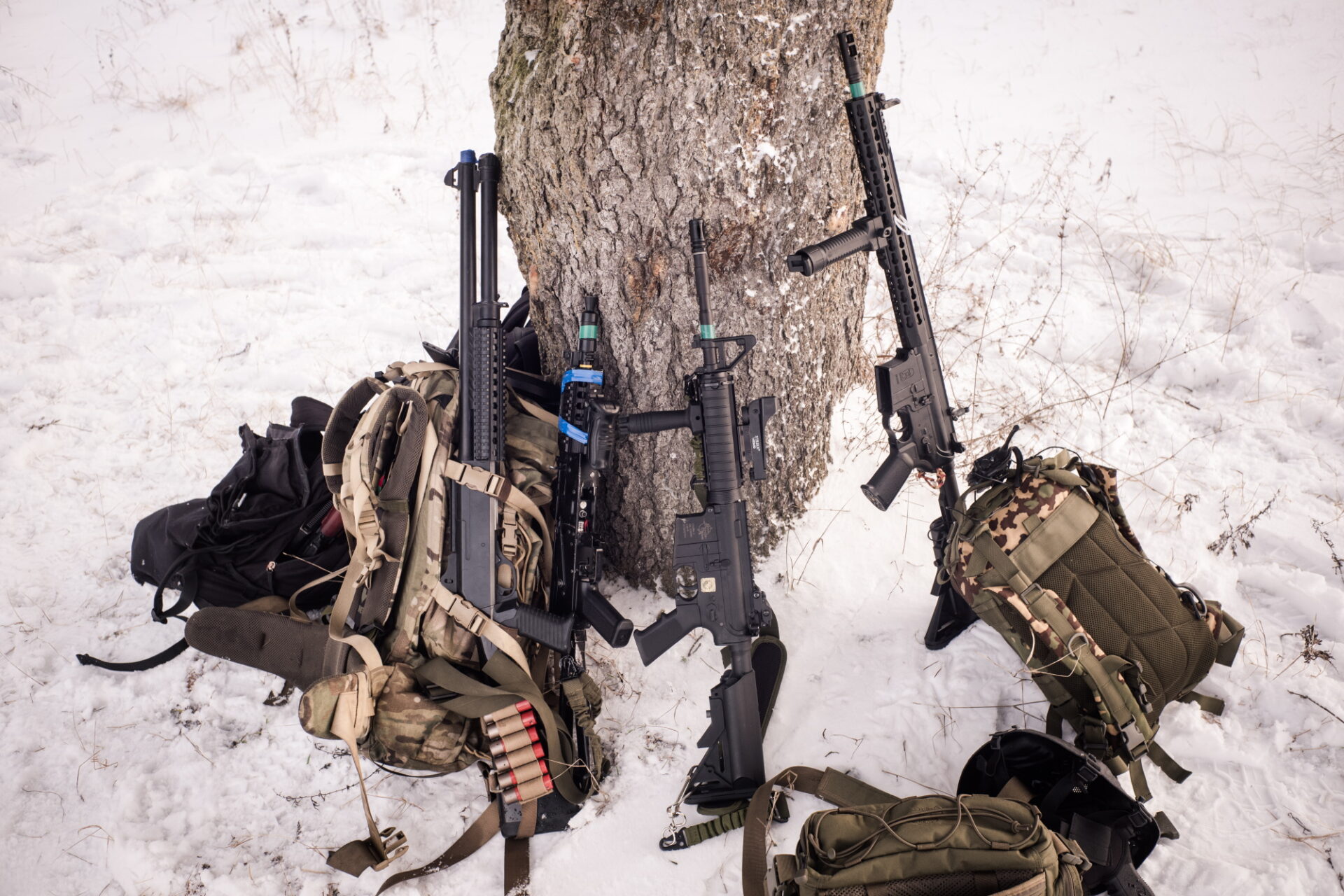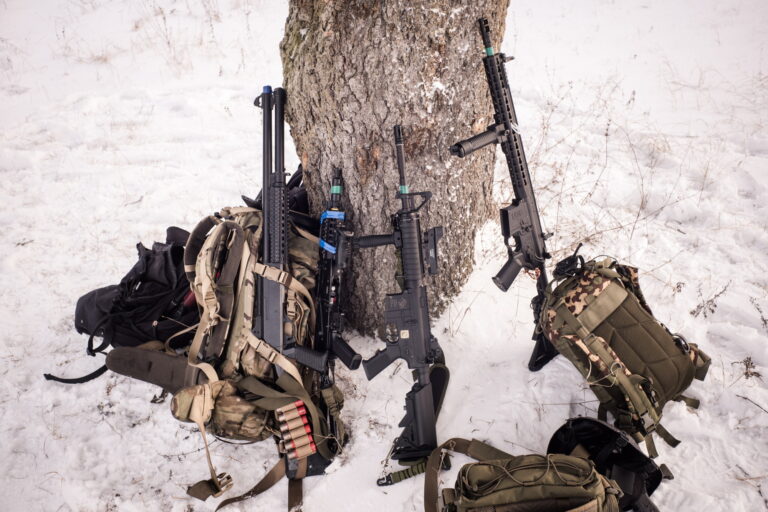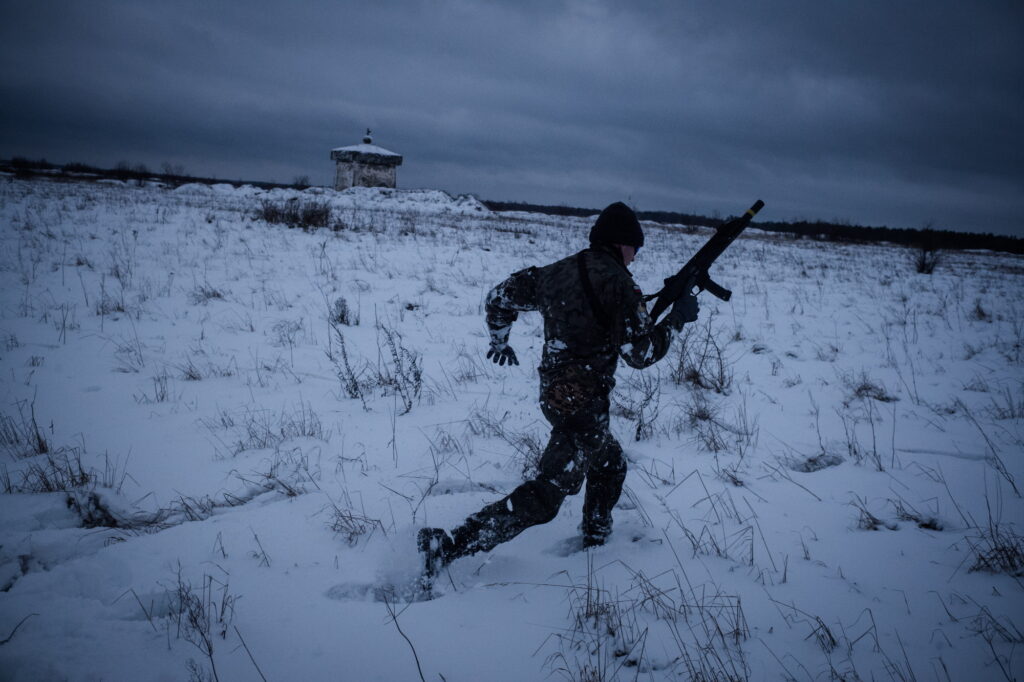Lobbyists and paramilitary organizations in Poland are struggling for a wider access to arms and ammunition. Pro-defense organizations and shooting associations tried to push through their own version of the law in Polish parliament.
The change of government in Poland in 2015 brought a change of the state’s attitude to militarism. When controversial politician Antoni Macierewicz became defense minister in Law and Justice government, money started flowing to pro-defense organizations in a growing stream. Authorities are promoting a military version of patriotism, patriotic education and military training. But the pro-defense organizations want more: access to real arms. And they almost got it.
The key to opening access to arms is to change the Polish law. Currently to get a gun, you need to pass psychological tests and difficult exams, and gun owners are monitored and checked by the police.
Arms in the parliament
It is December 2017 when a draft of a new law on arms is discussed in the Polish Parliament. ‘We are dealing with a landmark (…) bill today. (…) In the very sensitive and crucial area of national security, the state (…) is finally noticing its citizens. The people who are big-hearted for Poland, and whose enthusiasm (…) has served Polish security’ says a PiS MP Anna Maria Siarkowska from the parliamentary podium.
It is December 2017 and, as it will soon be seen, these are the final moments of minister Macierewicz in the Polish ministry of defense. His resignation is inevitable – in the two years of his command of the army he threw the Polish military off balance, fired the leading commanders and announced that Territorial Defence, a unit whose many members come from the paramilitary groups, was the most important of the armed forces.

Minister Macierewicz meeting WOT (Territorial Defence Force) in January 2017; photo: Robert Siemaszko (CO MON)
Macierewicz has a weak spot for paramilitaries. He readily visited training grounds to watch paramilitary organizations. In a field uniform, with a benevolent smile on his face, he promised them support, cooperation and money. He made it possible for paramilitaries to take part in the most important NATO military exercises in the region (the Anaconda and the Dragon). In 2017, during Macierewicz’ rule, a special program called Passport was initiated, under which pro-defense organizations, which have undergone training, can receive a certificate confirming they are suitable for collaboration with units of the armed forces.
School arms, machine guns
A draft of the bill amending the law on access to arms comes unexpectedly into the parliament on October 31st 2017. It is proposed by a group of MPs. Their leader is a right-wing MP Anna Maria Siarkowska.
Siarkowska comes directly from pro-defense organizations. She has sat on the governing bodies of association ObronaNarodowa.pl – Movement for Territorial Defense, which advocated the formation of voluntary territorial defense forces. She showed herself as a pro-life activist and supporter of tightening the anti-abortion law, an active participant in the March of Independence, and most of all an advocate of Macierewicz and his policies.
https://www.facebook.com/AnnaMariaSiarkowska/photos/a.544860172332179/981946378623554/?type=3&__xts__%5B0%5D=68.ARBVNwvo0q1G4lgk5fF0fssW-Yt-9HQgNZ2u3hl2gQylPQ5KiWFDIEIsvjhtwk6CIefvldKR3-xyLu90_tLFxRlyV-CSJZ-e0lA9bcPnE7URAzp61Yv7p6PwIdnS1E4NgPHvo-eIW_FM3CPmYDhCvQGAbaS9Ins72Gq9QntjZLAunTNo7YzdjR-8DbhjNsrr_E0BDr2leGJ0Nblv-qb4Nfjo1Qzvv0MFcoG4qxd6hwfDvUVempyulKnAwQgVwFwpXL7RUkie1-S2n1KdEjEIxJqxmxuqAtwrX0GAu5W-sI32Bp36iBSipysXRXb_VOz_E10oUuE5g0iU0Tqi_tZ9tN4&__tn__=-R
Siarkowska’s bill, though controversial, easily goes through the legislative path with the support of the ministry of defense. The bill introduces the so-called ‘school arms’ (for training purposes in school classrooms) and gives access to machine guns to organizations approved by the ministry of defense. The bill also allows the use of gun silencers in shooting ranges (which is now banned).
‘We have the impression that someone is trying to take advantage of the confusion around the change of prime minister [in December 2017 Beata Szydło resigned from the office and Mateusz Morawiecki was designated as new PM – VSquare] to quickly push this law through. We strongly disapprove of giving arms and military-type ammunition to pro-defense organizations. We believe it is dangerous, especially that there is talk about giving access to machine guns. This is a dangerous situation for citizens’, stressed opposition MP Łukasz Wójcik from Civic Platform in the parliament.
The opposition demanded that the law be rejected – as it turned out, it had not been consulted with representatives of the police.
Lobbyists have a voice
Meetings of the parliamentary committee are attended by representatives of social organizations. They highly praise the bill. VSquare checked who lobbied for it. Four representatives of the different organizations who attended the committee had been in fact, for over a month, members of a single shooting association: Firearms United Network.
On 28 October 2017, Tomasz Stępień, the President of the Firearms United, announced on Facebook that his association had signed a document of cooperation with the following organizations, among others:
– Vistula Shooting Society (Nadwiślańskie Towarzystwo Strzeleckie; financially supported by the ministry of defense);
– Polish Association of Firearms Collectors and Shooting Sports (Polskie Stowarzyszenie Kolekcjonerów Broni Palnej i Strzelectwa Sportowego);
– Association Vis et Honor.
This means that the alleged plurality of ‘public’ voices in support of Siarkowska’s bill was feigned. The shooting organizations which signed the agreement with Firearms agreed to be represented by the association in talks with the government.
Firearms United is not an ordinary association that brings together shooting enthusiasts, but a member of Firearms United Global, an international organization lobbying against the provisions of the EU directive on control of the acquisition and possession of weapons. One of its greatest successes was the collection of 315,000 signatures in Europe under a petition against the directive. Firearms United Global, also led by Tomasz Stępień, is registered in the EU’s transparency register. In the register, the association declared that 100 people are involved in its activities, but they work without compensation. According to the registry, in 2017 they collected 1,000 euros from membership fees and 3,000 euros from other sources.
But the members of the governing bodies of Firearms United Poland have private businesses, which would greatly benefit from a wider access to guns. Since February 2018, Tomasz Stępień has been a member of the Management Board and a partner in the company Molon Labe, registered as a potential manufacturer of firearms, ammunition, explosives, and cutlery. From November 16, 2018 Molon Labe has a concession for arms trade issued by the Ministry of Internal Affairs and Administration, covering the sale of, among others, firearms, ammunition and essential parts of firearms.
Stępień is also a partner in a company Instruktor Wero which offers shooting trainings. Firearms and Molon Labe share the same address.
Also Maciej Szadkowski, president of the Vistula Shooting Society, who signed the contract with Firearms United, is a firearms retailer. Until November 7, 2018 he was a member of the board of Mildat. It is a company that also has a license to trade in weapons and ammunition since February 28, 2017. Weapons and ammunition of any kind, except for anti-personnel mines. In addition, in the summer of 2016, ITProjekt, also owned by Szadkowski, sold 400 knives to the Military Unit of the Commando in Lubliniec.
According to the army the knives were probably counterfeits, so the prosecutor’s office was informed about it. As we know from the prosecutor’s office, in April 2018, Szadkowski was accused of marking the goods with a registered trademark. After three months, however, prosecutors dismissed the case “in the absence of signs of a prohibited act”.
“The law does not require to be changed”
At the time when the debate on the bill is going on in the parliament, politicians from PiS leadership already knew that minister Antoni Macierewicz was about to lose his position. On 18 December 2017, the Deputy Prosecutor General Bogdan Święczkowski, a close aide to the Minister of Justice writes a very short opinion on the bill: ‘The current state of the law in the area of the regulated matter does not require to be changed’. From that point on, work on the bill comes to a standstill.
The lobbyists, pro-defense organizations and shooting associations do not lay down their arms. Even before Siarkowska’s bill is prepared, some lobbyists tried to push through their own version of the law.
In the autumn of 2016, MPs from the Kukiz’15 party proposed a bill to facilitate civilian access to firearms. Although the bill was proposed by MPs, it had been entirely prepared by a private person, Jarosław Lewandowski, the President of the Foundation for the Development of Shooting Sports and co-founder of the Civic Movement of Firearms Enthusiasts (ROMB).
As revealed by the Newsweek Poland weekly, both organizations are ‘civil society organizations’, with members including owners of military shops and shooting instructors. Lewandowski himself, the person who wrote the bill, is the editor in chief of Strzal.pl magazine, where firearms manufacturers and retailers as well as organizers of shooting courses advertise.
Lewandowski and a Kukiz’15 MP Bartosz Jóźwiak, the rapporteur of the bill, openly admitted to a Newsweek reporter that the bill had been written by shooting activists from ROMB. ‘We made some adjustments, but I repeat, it is their work’ confirmed the MP.
Market worth hundreds of millions
The explanatory memorandum for the bill states that it is to adjust Polish law to EU Directive 91/477/EEC on control of the acquisition and possession of weapons. Member States were to implement it by September 2018. If they fail to do it by autumn 2019, they can be punished financially.
But opinions of the Office of Analyses of the Polish parliament and the government have shown that the ‘adjustment’ had been conducted sloppily and in breach of EU law. The overriding aim of the bill was – contrary to the spirit of the directive – to popularize access to firearms.
The authors of the bill calculated that, with the proposed changes, the private arsenal in Poles’ homes would grow from more than 400,000 firearms up to 1 million, which would increase the turnover of the firearms and accessories market by about 232 000 000 euros (1 million Polish zloty).
In September 2018, Andrzej Turczyn, a blogger and weapons enthusiast revealed another draft amendment to the law on arms and ammunition, with comments by Tomasz Stępień, the President of Firearms (a business and lobbyist organization).
The contents of the comments suggest that people from Firearms introduced changes to the bill. In his notes on the margins of the document, Stępień explains that the insertions or deletions adjust Polish law to the EU directive. But some of the changes can not be explained by the requirements of the European act.
Lobbyist’s notes on the bill
Stępień proposes to remove the word ‘important’ from a provision stating that the police shall issue a firearms license only when an ‘important reason’ is provided. As a result, the police would lose discretion to evaluate whether someone should get a license. Instead, they would be forced to issue a license every time someone makes a request and meets simple conditions. What would they be? Simply to go through training in a shooting club. In short: access to firearms would be very easy.
Stępień proposed more than 80 changes on the 45 pages of the bill. We have called Tomasz Stępień and asked if he had prepared the bill. ‘No’ he replied, after a pause and a sigh. ‘We just gave our opinion. This is just one of documents prepared by the parliament which we have given our opinion on. There were at least a dozen versions, prepared by various circles’.
‘So who prepared this bill?’
‘I don’t know’
‘So who gave it to you, asking for an opinion?’
‘Next question please’
After this conversation, we asked the prime minister’s office, who wrote these amendments to the law on arms, who is involved in the consultations and why these works are not entered in the list of legislative works? In response, the prime minister’s office replied that it is working on the draft of another act concerning the production and trading of weapons, the purpose of which is to implement changes in EU law — but the office did not answer any of our questions.
Writing bills by lobbyists is not legal in Poland, but in practice it is difficult to punish anyone for it. – This is another example of total deadness of the law on lobbying in the law-making process. It should be fully transparent at every stage, so that citizens have an opportunity to check who submitted the amendments, who worked on them, who consulted. The public has the right to access such information. I would like to be able to find out about the lobbying for access to automatic weapons for pro-defense organizations from government websites, not from a journalistic investigation – says Grzegorz Makowski, PHD from Stefan Batory Foundation.
On January 5th 2019, Firearms United organized a conference about the directive limiting access to guns, in a small town of Zduńska Wola. In photos from the conference, a uniformed gentleman in the front row attracts the eye. He is colonel Krzysztof Gaj, a co-founder of the Territorial Defence Forces, dismissed after the disclosure of his anti-Semitic and anti-Ukrainian statements: ‘I’m not a Russia lover, let me emphasize this strongly, but at this point I fully understand Putin – they are fascists. And Putin is absolutely right – we need to fight them, or Europe will be engulfed in conflagration because of them’.
Colonel Gaj’s pro-Russian views have been described by Marcin Rey, an exposer of Russian propaganda on the Polish internet. According to him, colonel Gaj belongs to a pro-Russian movement in Poland.
Participants of the conference complained about ‘reports of pressure from the governments of European countries on local weapons manufacturers, aimed at discontinuing their support for Firearms United Network’. The highlight of the conference was a presentation of an automatic rifle with an integral silencer, delivered by Mex Armory, a Polish armaments company.
On the occasion, President Stępień announced a new idea to build a ‘Patriotic and Defensive Initiative of Legal Gun Owners’. In distress, Poles owning their own guns would be involved in armed combat.
As we have established, Colonel Gaj did not find himself accidentally in Zduńska Wola. It turns out that for several months he has been an official at the Chancellery of the Prime Minister (he works in the department of defense analyzes). According to unofficial information, on behalf of the Chancellery of the Prime Minister, he also consults the act concerning the production and trading of weapons, which was piloted by the Ministry of Internal Affairs.
Our interlocutor from the government: – In my opinion, any of those bills will not be accepted before the election in autumn 2019, because it raises too much emotion and controversy. Always someone will be dissatisfied.
This article is a part of a research supported by the IJ4EU grant. The IJ4EU fund is not responsible for the content and any use made out of it

An investigative journalist at FRONTSTORY.PL, Daniel Flis previously was on the investigative team of OKO.press and Gazeta Wyborcza. OCCRP Research Fellowship Program recipient. Participant in international investigative projects of the Reporters Foundation.
Anna Gielewska is co-founder and editor-in-chief of VSquare and co-founder of Polish investigative outlet FRONTSTORY.PL. She is also vice-chairwoman of Fundacja Reporterów (Reporters Foundation). A journalist specializing in investigating organized disinformation and propaganda, Gielewska was the John S. Knight Fellow at Stanford University (2019/20) and has been shortlisted for the Grand Press Award (2015, 2021, 2022) and the Daphne Caruana Galizia Award (2021, 2023). She was the recipient of the Novinarska Cena in 2022.









